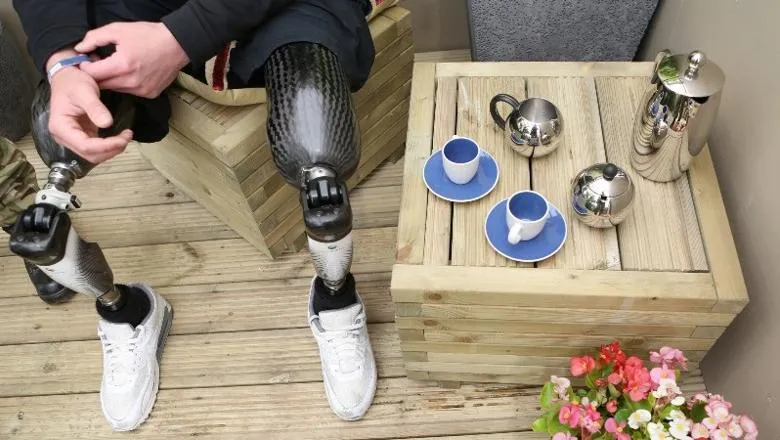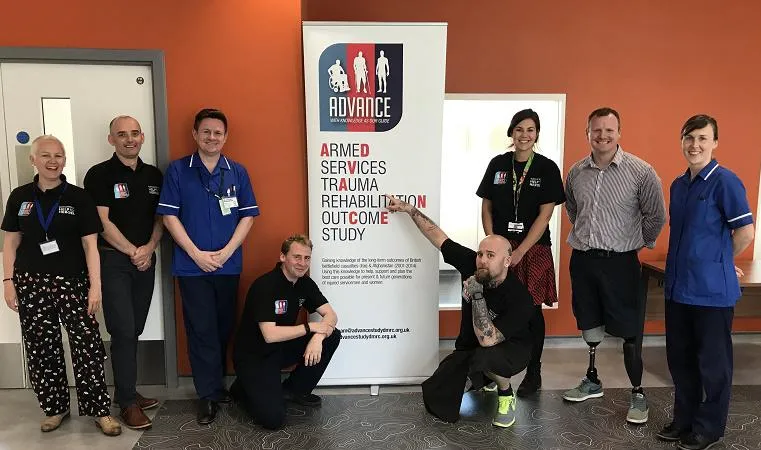We are extraordinarily fortunate to be the beneficiaries of the generous decisions of the trustees of the Headley Court Charity, Nuffield Trust for the Forces of the Crown and Blesma. Our thanks go to them on behalf of those who will benefit from the unique learning of the ADVANCE Study, and we shall look forward to demonstrating the impact their donations will enable for our wounded and their families.
Lord Boyce, Chairman of the ADVANCE Study Charity
18 February 2020
Unique military medical research study receives funding for ten years
The ADVANCE cohort study, a unique twenty-year study into the health of military veterans, has secured crucial funding for the next ten years

The ADVANCE (Armed Services Trauma Rehabilitation Outcome) study has recently received a very substantial grant from the Headley Court Charity of £10 million, complemented by a special grant of £1 million from the Nuffield Trust for the Forces of the Crown to mark the Trust’s 80th anniversary, and a five-year commitment from the charity Blesma, The Limbless Veterans (£250,000). This new funding will assure the future of the study for the next ten years and will build on the funding from the Ministry of Defence, LIBOR fines and Help for Heroes which enabled the setup of the study and the recruitment of the baseline cohort.
The ADVANCE study investigates the long-term physical and psycho-social outcomes of battlefield casualties from the UK Armed Forces following deployment to Afghanistan between 2003 and 2014. This study, costing over £1 million per year to run, is a collaboration between the Academic Department of Military Rehabilitation at the Defence Medical Rehabilitation Centre (DMRC) Stanford Hall, Imperial College London and King’s College London, and is the first prospective cohort study in this area. It aims to follow up and support this group of UK service personnel – 600 severely injured servicemen and 600 uninjured servicemen who act as a comparison group – for a period of 20 years. The study is looking at a wide range of outcomes, including cardiovascular disease, osteoarthritis, mental health and social outcomes.
Professor Nicola Fear, Co-Director of King’s Centre for Military Health Research (KCMHR) said: ‘Little is known about the long-term impact of being a combat casualty. Securing this study for the next 10 years will enable the research team to explore the health and wellbeing of these service personnel, thus ensuring the development of and implementation of interventions and support for this population.’
Professor Sir Simon Wessely, Regius Professor of Psychiatry at King’s College London, KCMHR Co-Director and ADVANCE Charity Trustee said: ‘We are absolutely delighted with the news that the future of the ADVANCE cohort has been secured for the next ten years. We owe it to those who have been severely injured in the recent wars in Iraq and Afghanistan, and those who may sadly be so injured in the future, to understand as much as we can about the long term physical and psychological consequences, and how we can mitigate them.’
ADVANCE is unique – it involves state of the art science, but also an acknowledgement of the costs not just to the person themselves, but their families. It is a collaboration between science, the Armed Forces and the veterans themselves. The country must be proud of those who served and suffered, but also proud of the fact that ADVANCE makes us world-leading in the science of rehabilitation and mental health.
Professor Sir Simon Wessely, Regius Professor of Psychiatry at King’s College London, KCMHR Co-Director and ADVANCE Charity Trustee

Recruiting participants is one of the biggest tasks of the ADVANCE study team. As of the end of January 2020 the study is fewer than 100 participants away from meeting its target of 1,200 participants. Over the next few months the study team will be busy recruiting those last participants. It will be a big milestone to reach 1,200 participants and finish the baseline recruitment, and the subsequent follow-up visits will reveal the results that really will influence future care.
The participants will contribute towards world class research that will improve future combat casualty care. Participant Jonathan Grave said: ‘I have a genuine interest in health and research and really believe the study has good intentions. And more importantly, I wanted to contribute towards ADVANCE and help research that will support long-term care outcomes for serving personnel and veterans. It is vital for ADVANCE to continue researching the long-term health outcomes of battlefield casualties from 2003-2014. ADVANCE will benefit current and future serving personnel and veterans – it’s just what we need.’
I wanted to contribute towards ADVANCE and help research that will support long-term care outcomes for serving personnel and veterans. ADVANCE will benefit current and future serving personnel and veterans – it’s just what we need.
ADVANCE participant Jonathan Grave
Professor Sir Simon Wessely added: ‘ADVANCE is is unique – it involves state of the art science, but also an acknowledgement of the costs not just to the person themselves, but their families.It is a collaboration between the world-famous Defence Medical Rehabilitation Centre, Imperial College London and King’s College London, one world famous for its science and engineering, the other for mental health and well-being. It is also a collaboration between science, the Armed Forces and the veterans themselves. The country must be proud of those who served and suffered, but also proud of the fact that ADVANCE makes us world-leading in the science of rehabilitation and mental health.’
